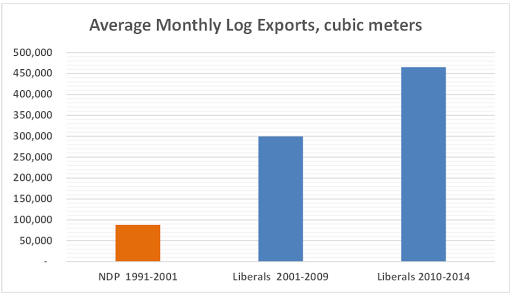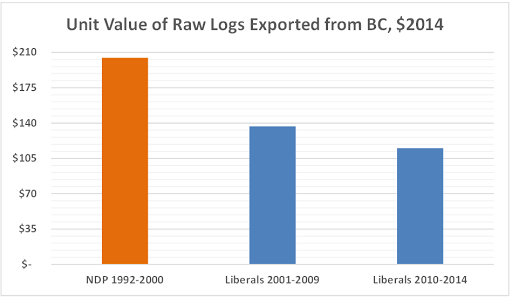
BC Stats published the monthly numbers for log exports to November 2014. The number reinforce arguments made in a recent Times Colonist Op Ed. An excerpt:
B.C. government has gradually abandoned the province’s forestry heritage in pursuit of an unsustainable pipe dream: liquefied natural gas exports to Asia. The better option — for a resilient economy and for our climate — is to rebuild an innovative, sustainable forestry sector.
That’s not to say that forestry doesn’t have its own problems.
The current industrial model that has dominated forestry in western Canada is based on endless extraction and minimal domestic processing of timber resources. This approach has harmed watersheds and degraded entire ecosystems.
At the same time, we’ve seen more unprocessed or under-processed timber leave the province, resulting in a downward spiral of mill closures and layoffs. Clearly, this model is failing our forest ecosystems and forestry-dependent communities and families.
British Columbia lags far behind other jurisdictions in terms of jobs created per unit of timber harvested. In B.C., to create one full-time, year-round job we must cut 1,189 cubic metres of timber — one cubic metre roughly equals one city telephone pole. In Ontario, the forest industry produces one job for every 205 cubic metres of timber harvested, meaning they can cut the same amount of trees and employ almost six times as many people (or cut one-sixth of the trees and provide the same amount of jobs)…
BC Stats reports the quantity of raw logs exported and the value. Both trends are troubling.


The graphs immediately suggest the possibility of transfer pricing schemes. A few years ago, The Guardian newspaper did a series on tax avoidance and one article was Shifting profits across borders:
In recent days the Tax Gap series of articles has identified secrecy, complex organizational structures, tax havens and profit hungry accountancy firms as the key ingredients of the tax avoidance industry. They all come together in the biggest tax avoidance scheme of all, known as “transfer pricing”. The name of the game is to shift profits to low tax jurisdictions and avoid taxes in countries where corporations have substantial trading operations.
…There are international rules on transfer pricing, but they all rely on notions of “costs” which are highly malleable. Tax rules require companies to use “arm’s length” or normal commercial prices to transfer goods and services, but such prices are not always easy to find. Many markets are thin and often dominated by the same multinationals…
I raise a point made before by this blog. In Understaffed and incapable, by design, I wrote:
…material revenues were failing to reach government coffers because industry routinely undervalued and under-reported production. The individual said this continued because government’s enforcement resources were inadequate to ensure collection of amounts properly due. An additional allegation was that mid-level officials were aware but believed corrective action was not welcome at the highest levels.
If forest conglomerates are avoiding taxes by accounting schemes, the BC government has few resources to prevent fraud and protect the public interest. Sadly, for BC Liberal leaders, that may be a considered strategy.
Categories: Forestry, Log Exports




BC Jobs Plan: IMPORTED LABOUR
http://www.theglobeandmail.com/news/british-columbia/proposed-murray-river-mine-to-rely-primarily-on-foreign-workers/article22373861/
LikeLike
Captain Vancouver reported BC timber was virtually worthless because it was too big. CPR didn't refuse the grant of east Vancouver Island, though, when it extorted its contract “extra” from the pro-Canadian faction— with a value that would boggle the mind even today. Few fully realized the true value of BC forests back then and, after a century of liquidation, we've returned to indifferent ignorance of the resource.
I lived in Port Albernout when Mac-Blo had the highest productivity sawmill in the world. In 81 we went on strike for 18% and got a sandwich wrapped in a road map. I saw a convoy of b-trains hauling away the Toyota dealer's stock, plus the marquis; After about three years the fire marshall ordered vacated buildings in the downtown demolished.
The Socreds worsened the crash with their “restraint” program while business frontages of mill towns began to look like toothless grimaces. I took many sojourns to the woods in Alberta and got a forestry diploma, but real wages continued to drop in spite of skills upgrading. By the beginning of the 90s the wolf-kill program was happening, Socreds planned to open up parks to private concessions, Mac Blo was disgraced by obscene logging waste in the Charlottes and the equally venerable TM Thompson ended their long BC consultancy by lying about it and getting caught. The “War in the Woods” tallied new battlegrounds almost daily: Clayoquot, Lyell Island, Carmanah, Stein, etc.
A prosperous decade began when the NDP took over government. The Forest Practices Code finally addressed smouldering issues: First Nation inclusion in policy-making, increasing parks and protected areas, protecting wildlife, billing for logging waste and reducing the allowable annual cut to sustainable levels. Yet camp culture was in a state of shock with many erstwhile union workers moving —with their long-guns—over to the Reform party. Work was fairly steady, if not well-paid. I realized one night in some cookshack somewheres that at 45 years old I was the youngest guy in camp; when I'd started in my late teens, about 25% to 30% of every camp was under 25 years old.
I'd expected the industry to generally slim down with annual cut reduction, but the elimination of an entire demographic didn't bode well. The industry had to absorb a 20-year gap in mature timber supply (the result of previous over-cutting). Unable to demand the decent wages of previous years, unions abandoned what little enthusiasm for apprenticeships they ever had, and adopted a policy of orderly attrition of aging workers. I'd gotten a highly regarded BCIT forestry diploma in the early 80s; by the time the BC Liberal government had entrenched itself, BCIT no longer had a forestry faculty. It had died for lack of interest.
The dying mill towns and an industry dominated by trucking are the hallmarks of the BC Liberal government's raw-log export policy, but the real legacy of this neo-right experiment gone wrong is the fading of the once mightiest industry from our consciousness. The crusty old timers are disappearing and nobody's replacing them. Like tourism and fishing, forestry is fading from memory—literally: we don't even know anymore how much timber we have, nor how fast it's growing, the BC Liberals having neglected inventory for over a decade.
Does it matter that we become less and less familiar with our forests? I suppose it might not if the government's idea of letting truck-loggers harvest in parks to “compensate” them for timber they “lost” to the pine beetle makes sense to you. But if it doesn't, the lack of timber inventory, and a parks system now invigilated only by “trail closed” signs might be cause for concern.
Thanx for the brief synopsis, Norm; the longer story is a sad one indeed.
LikeLike
isnt Colemans brother in the forestry business.?
Each forestry job has a job multiplier 4x effect so 1000 sawmill jobs equals 4000 jobs overall
At least once log have been re graded to steal taxes.in terrace ,I believe.
http://powellriverpersuader.blogspot.ca/2013/11/rich-coleman-british-columbias-minister.html
LikeLike
If Seanex could provide tens of thousand of jobs and billions to the BC treasury, I'd buy Seanix. But, it's a nonsense argment. Comparing a trainload of oranges to tiny piece of apple.
LikeLike
There is plenty of self-serving foolishness that allows claims that shipping raw logs overseas at a fraction of their potential value is good for the economy and somehow preferable to the way business was once conducted in BC. Sure, it is good for the few people who harvest the logs but they would still have their incomes if logs were delivered to modern BC sawmills for value added processing. Then, we would have the maximum economic activity and quality employment available.
The boffins of industry don't care about BC jobs and don't want to make investment in timber production facilities. They prefer quick profits that arise when values are minimized while assets remain on Canadian soil – thus avoiding taxes and royalties – and wood gains its value overseas and profits are hidden in tax shelters.
Allowing people to rob banks would be financially rewarding to the robbers but it wouldn't be helpful to the people who owned the money. Some folks would say that's ok, the bank robbers are doing very nicely.
LikeLike
Consider that those raw logs do mean well paying jobs in the forest industry, plus their suppliers, and also the jobs involved with the movements. The difference of course is the added value jobs at the lumber mill, but if for the buyer it makes more sense and cheaper to finish the raw logs at destination rather than B.C. why not? Why eliminate forestry jobs on the basis of resciding raw log exports if there's limited market for BC finished lumber?
For those who oppose raw logs, do these people buy made in BC computers such as Seanix? Or do they buy what's available from offshore? (A reverse situation)
LikeLike
Fantasy island vancouver style with Victoria as capital
BC taxpayer being played on all fronts.graft ed?
LikeLike
I think Coleman is the de facto “decisionmaker” in this province. This has his fingerprints all over it.
LikeLike
When reading this, be aware that a report of the U.S. Forest Service about the Pacific Northwest said, “Logs sold to the export market are No. 2 and better – average quality and better. Sales to the domestic market range over all log qualities.”
In other words, the best quality B.C. logs are being loaded on ships for export while the worst quality logs go to our own sawmills.
This for makes financial sense for a few beneficiaries but not for B.C. people as a whole.
LikeLike
Burrard Thermal is being mothballed supposedly because it emits CO2 in operation.
But producing, transporting and utilizing LNG emits huge amounts of CO2.
BC Govt still says exporting LNG from BC will fight climate change.
LikeLike
The BC Liberal 2013 election platform regarding forestry promised to:
• Work with coastal industry to balance unprocessed wood exports and wood supply for mills.
• Co-sponsor with forest industry annual trade missions to China, India, Japan and Korea.
• Work with industry to build Cellulose Filament research facility in Chetwynd.
If unprocessed wood exports are being balanced with wood supply for mills, we should be hearing that the mills are receiving an increase proportionate to the increase of raw exports shown in the graph above. Instead, we’re hearing of mill closures, with lack of supply cited in some cases.
According to a 2009 paper by the Sauder School of Business at UBC, international trade missions have small, negative, and mainly insignificant effects.
The cellulose research facility was built in Quebec, and the BC government’s $2.25 million funding support for research there was announced in April of 2014
LikeLike
The plan, if it was to export 5x as much raw timber, at half the price, is working.
Woo? Hoo?
LikeLike
https://m.youtube.com/watch?v=b42VRhiiF3A
https://m.youtube.com/results?q=bc%20raw%20log%20export&sm=3
LikeLike
How about bc has abandoned its citizens ,abandoned Burrard thermal 950 mW dormant for 10.000 million dollar 1100mW site C dam?
1 Million jobs is that part of a 100 year plan?
LikeLike